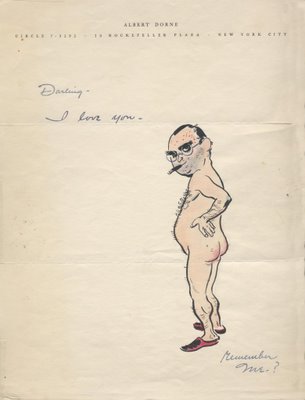Flagg's autobiography makes fun of the contrast between illustrator Albert Dorne and Dorne's wife. According to Flagg, Dorne's wife was beautiful, petite and elegant while Dorne looked like a brute who might murder you in a dark alley.

It's true that Dorne carried the psychic scars from his childhood in the slums. He had to scratch and claw his way out of Hell's Kitchen not only for himself but for his mother, his two sisters and his younger brother. He worked as a boxer and dealt with terrible situations that, in his own words, left him "hard boiled." Not surprisingly, he became a heavy drinker with a difficult personality. He rapidly went through three marriages.
But somewhere along the way, Dorne began to outrun his demons. He seemed startled to find himself capable of a permanent relationship with his fourth wife. After fifteen years of marriage, he said "I am slowly and definitely being convinced that this is it." This self-portrait from Dorne was found among his wife's personal effects after she died:

In the safety of his marriage, even the "hard boiled" Dorne could be reborn as the nubile nymphette from September morn.
Biologists used to wonder why nature invented such a complicated, impractical process as sex, which requires two parties coming together to perpetuate the species. Compared to the asexual reproduction that worked so well for our single-celled ancestors, sex seems highly inefficient. Two separate organisms must overcome many obstacles to find each other and mate. And that's even before you take into consideration the problems caused by that time you showed up late for dinner.
The answer, biologists tell us, is that the parasites and bacteria all around us evolve more rapidly than we do and would soon learn to evade their hosts' immune systems if we did not rearrange our genes with each new generation. By blending ourselves with another person, we force our natural enemies to begin all over again.
The same observation might be made about relationships in general.
When two individuals combine, they have a chance to fill in blind spots and compensate for weaknesses that might otherwise harden during a solitary existence. It is not easy to "rearrange your genes" with another person (as Dorne's first three marriages demonstrate). However, the process can sometimes normalize thoughts and behavior which, if left to grow in isolation, might overtake us like the parasites and bacteria. As Bernard Malamud wrote, "if a man is not careful his own thoughts can poison him."
In the 33 years of his last marriage, Dorne overcame his childhood traumas. He ended up a nationally prominent illustrator, president of the Society of Illustrators and wealthy beyond his wildest dreams. He was an art collector and philanthropist, founder of the Famous Artists School (and then the Famous Writers and Photographers schools, with more than 50,000 students in 55 countries). He was appointed to the President's Committee for the Employment of the Handicapped and devoted substantial time to nurturing young talent. A well deserved happy ending for a very special and powerful man.











